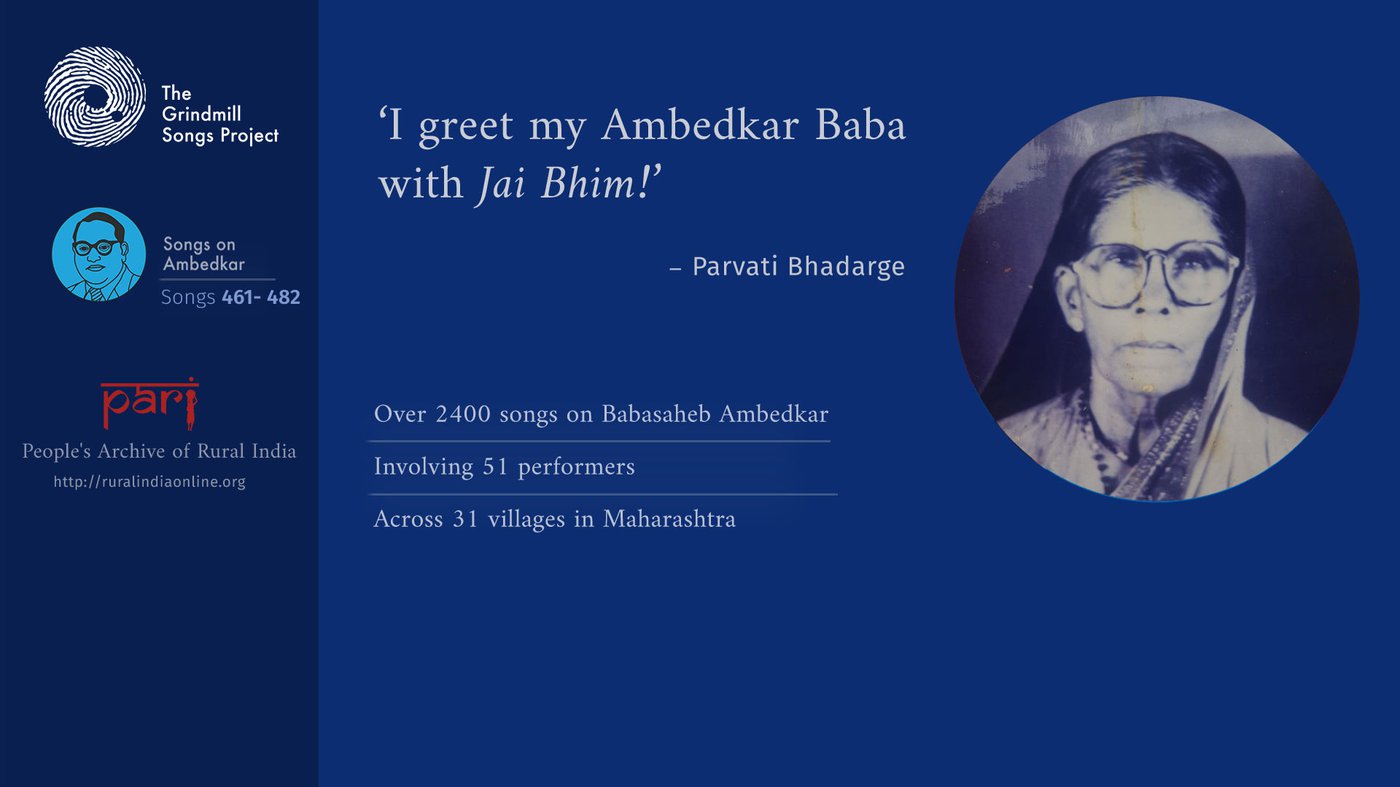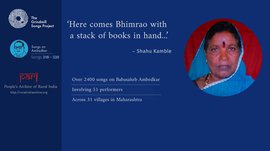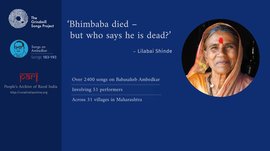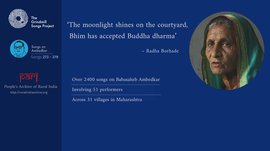A mother and daughter from Majalgaon sing songs of love and affection for the young Bhimrao Ambedkar and Ramabai, making them a part of their own household
Ramabai applies
kunku
on the round-shaped wax [on the forehead]
Bhim says from the airplane, O Rama, come with me
With this ovi , Parvati Bhadarge gives us a glimpse into the lives of a young Bhimrao Ambedkar and Ramabai. The song has two meanings: first, the obvious one, of the enduring love between a young husband and wife; second, an underlying one, which hints at the many years of separation that the couple endured when Bhimrao studied abroad while Ramabai took care of their family at home.
In some of the couplets, the singers portray the prosperity of Ramji Sakpal, Bhimrao’s father. They count the many horses he owns, and sing about the tank of sweet water for the animals. Their pride in, and affection for, Babasaheb Ambedkar and Ramabai feeds their imagination, which might sometimes be a little removed from reality. How did Bhimrao and Ramabai get married? What was it really like?
They were very young when they married in 1906, as was the tradition of those times. Bhimrao was 14, having completed his matriculation exam, and the girl, Rami Valangkar, was merely 9. Ramji Sakpal chose the bride for his son. Rami came from a poor family from Vanandgaon in the Konkan region, where her father worked as a porter. After her parents passed away within a short time of each other, Rami and her younger brother and sister lived with their paternal uncle in a
chawl
in the Byculla vegetable market in Mumbai. The wedding ceremony of Bhimrao and Rami was held there and took place at night, when the market was empty of buyers and sellers.
Rami was renamed Ramabai after marriage. Bhimrao affectionately called her ‘Ramu’. For her, he was always ‘Saheb’, literally meaning ‘sir,’ a term that combines a wife’s affection, respect and reverence for her husband when she uses it for him. The hard life she led in her younger days revisited Rami in the years after marriage, when Bhimrao went abroad to study. They had five children, of whom four died in childhood. During Bhimrao’s absence, Ramabai faced the many losses of loved ones in the family, including their children, alone.
The 22
ovi
presented here, sung by Parvati Bhadarge, from Bhimnagar hamlet in Beed district’s Majalgaon
taluka
, accompanied by her daughter Rangu Potbhare, start with this beautiful idea: “Your voice and mine, let it become one, like the flowing current in River Ganga”. The narrator tells her neighbour that Bhimrao and Ramabai Ambedkar are visiting her home and she is making the stuffed
puranpoli
sweet for them.
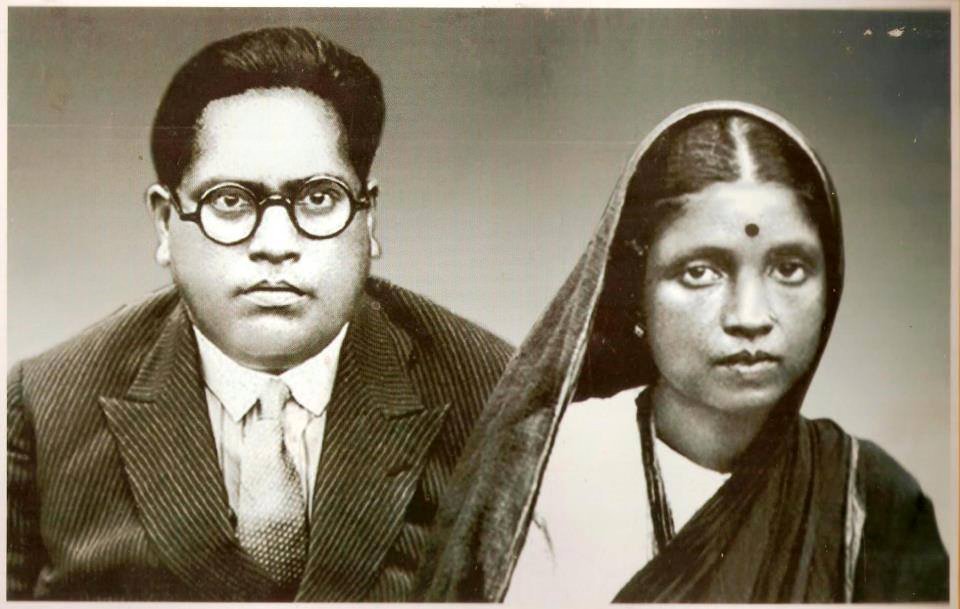
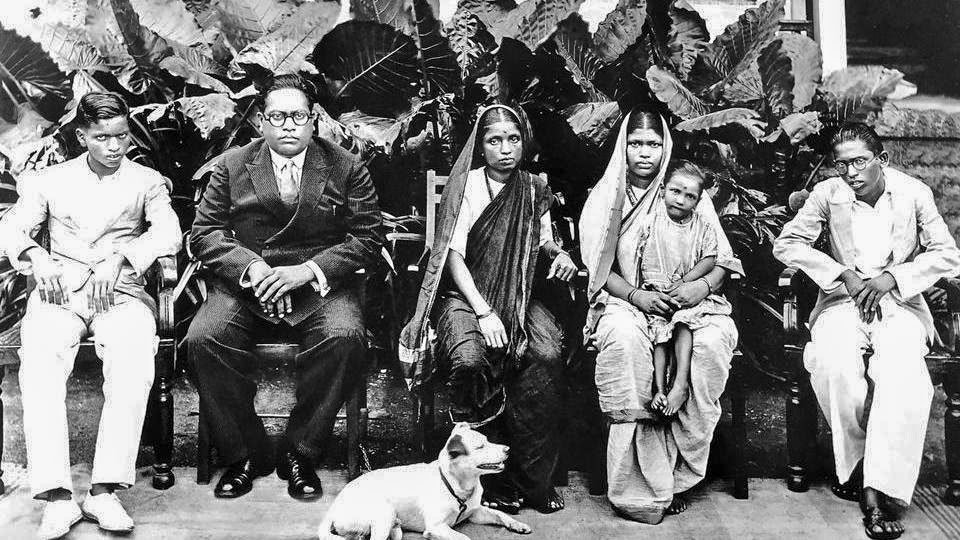
Left: Dr. Babasaheb Ambedkar with Ramabai Ambedkar in 1934. Right: At their Rajagriha bungalow, Bombay in February 1934. From left: son Yashwant, Dr. Ambedkar, Ramabai, Babasaheb's brother's wife Laxmibai, nephew Mukundrao, and their dog Tobby
With a sense of pride, the women sing about the horses that Ramji Sakpal owns, and the special mare that the young Bhim rides, worth a thousand rupees, with a quilt worth three hundred. Goddess Lakshmi arrives at Bhimrao’s house after many stops on the way, the narrator says, pcituring wealth and prosperity in the household. In reality, the family was not wealthy at all. Ramji Sakpal was a retired army subedar , and the family resided in Dabak Chawl at Lower Parel in Mumbai. In the composer’s eyes, Bhim is like a rose flower. She imagines him and Ramabai wearing the traditional bashinga , a head ornament, for their marriage ceremony in Ramji’s house.
In another couplet, the singer mentions that 12 years of her youth were spent toiling at the grindmill. The work soaked her in sweat. It was Ramabai, or Ramai, she says, who was the mother who gave her strength to do the gruelling work, by giving her nutmeg with opium in her childhood to strengthen her arms.
Ramabai had earned the name of Ramai, or ‘Mother Ramabai’, for her sacrifice and self-respect during the years that Bhimrao was away. Though she faced difficult times financially, she refused to accept gifts of money from friends and well-wishers. When Ramabai once stayed with a friend who ran a residential school for children, she found that the kids had been going without food for a few days since the government’ supply of provisions had been delayed. Not willing to let them starve, she handed over her gold jewellery to be sold or pawned so that food could be bought. The children called her Rama Aai or Ramai with gratitude and affection. That endearing name continues to be used till this day.
In one
ovi
,
the narrator imagines the infant Bhim, and the immense pleasure she will feel when she goes to her parental home and rocks his cradle. In another couplet, Bhimrao is her brother, and Ramabai the affectionate sister-in-law whose loving presence in her parental home relaxes her.
In the final
ovi
of this set, the narrator’s happiness spills over as she sings that her home is filled with guests and she greets Babasaheb Ambedkar with ‘Jai Bhim!’
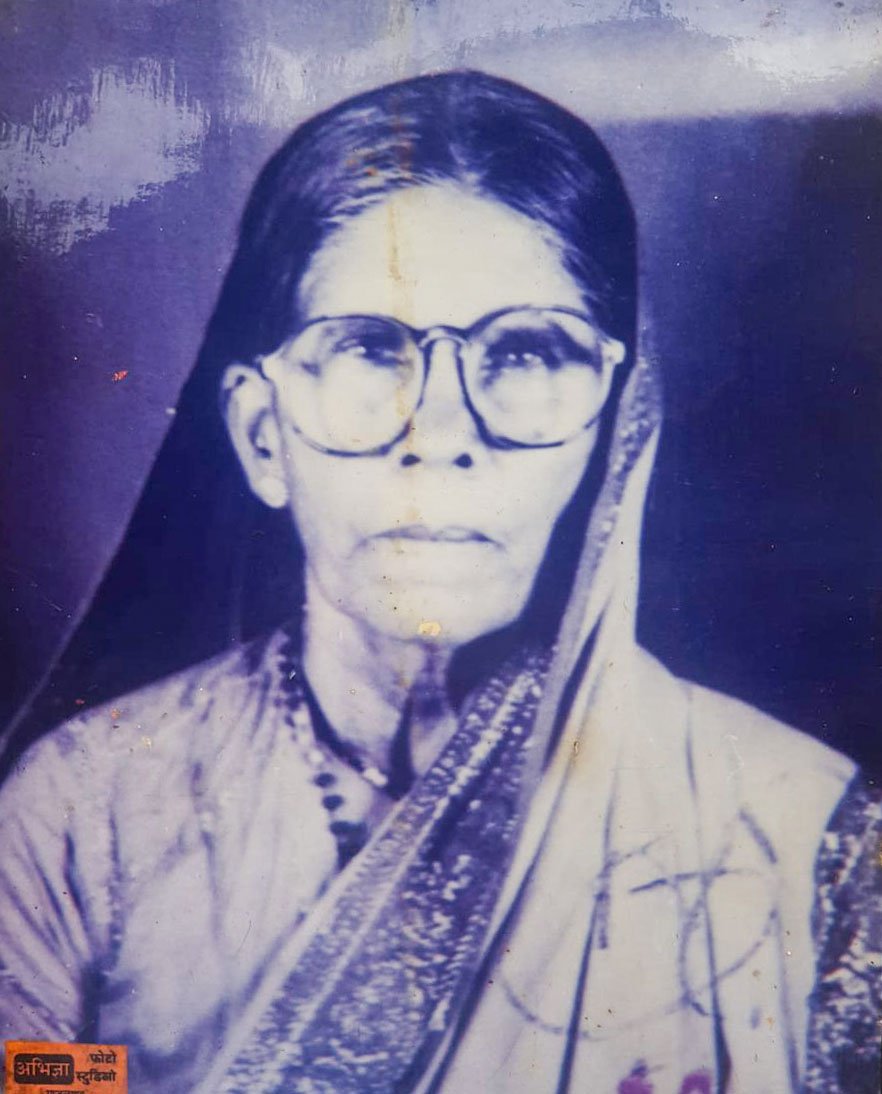
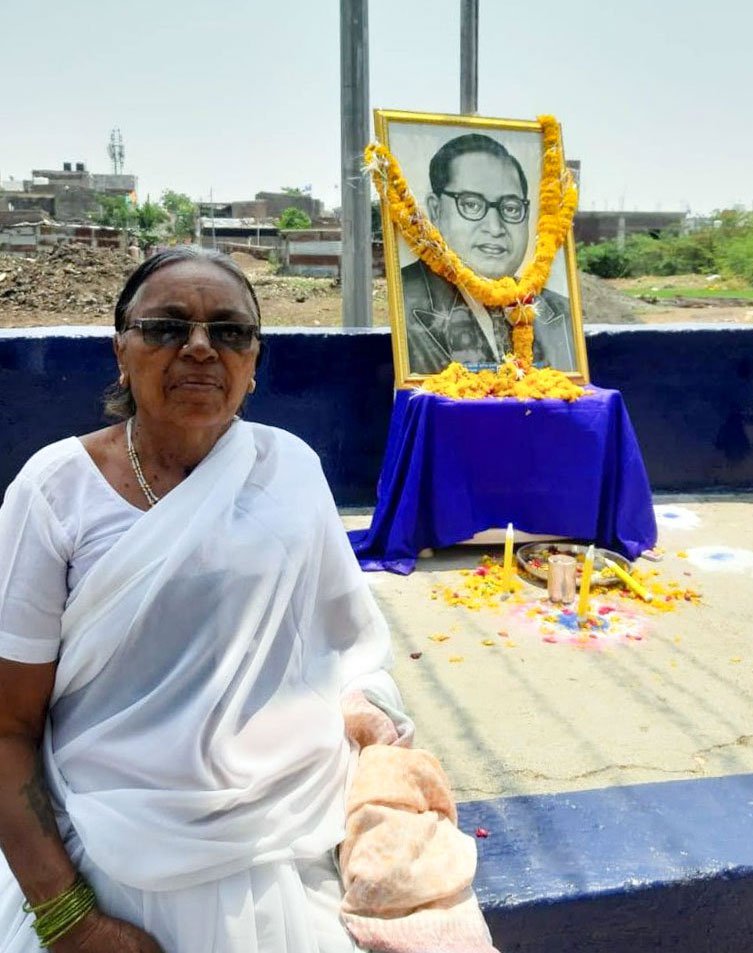
Left: An old photo of Parvati Bhadarge. Right:
Rangu Potbhare
in Majalgaon's Bhim Nagar on Ambedkar Jayanti in 2021
बाई तुझा माझा गळा, येऊ दे एक सारं गं
येऊ दे एक सारं गं, जशी गंगेतली धार गं
माझ्या घरला पाव्हणा, शेजी म्हणिती कुठले
माझे आंबेडकर बाबाचे गं, टांगे रस्त्याला सुटले नं
बाई पुरणाची पोळी, लाटिते घाई घाई
माझ्या घरला पाहुणे गं, भीमासंगं रमाबाई नं
रमाबाई कुंकू लेती, मेणावरी गोल गोल
भीम इमानातून बोलं गं, रमा माझ्या संगं चाल नं
बाई घोड्यावरले सोळा, बाई पायदळी किती
माझं रामजी हे पिता गं, सून पाह्या गेले राती नं
बाई घोड्यावरी सोळा, काई पायंदळी मोजा
माझा रामजी त्यो पिता गं, सून पाह्या गेला राजा नं
घोड्यावरी राम राम, कोण सोयरा ढेकीचा
माझ्या लाडक्या रमाचा गं, पती लाडक्या लेकीचा नं
माझे आंबेडकर बाबा गं, पती लाडक्या लेकीचा नं
अशी वाजत गाजत, उन्हाचं काय येतं, शिरी बाशिंग सोन्याचं
रामजी पित्याच्या नं घरी गं, लगन भिमाचं लागतं नं
घरी आली लक्ष्मी, आली उठत बसत
आली उठत बसत गं, वाडा भिमाचा पुसत नं
बाई मानाचं गं कुंकू, लावा जोत्याच्या पायरी गं
लाडकी रमाबाई गं, मानकरीण नाही घरी गं
बाई सवाषीन ठिवा, आला पाव्हुणा दुरुन
भीम सख्याची ही राणी गं, आणा खंदील लावून गं
बाई बाजार भरला, बाई हजार किल्ल्याचा
माझा आंबेडकर बाबा, वळखू नाही आला गं,
भीम बारीक शेल्याचा नं
बाई दवुत लेखणी, आहे पलंगाच्या हाताला
मीरा पुसती भाचाला गं, किती परगणा जितिला
बाई दळण दळीलं, पीठ भरितते गुंडीत
माझा आंबेडकर बाबाले गं, तान्ह्याले दहेलीत गं
बाई हजाराची घोडी, पाणी पेईना वढ्याला
रामजी पित्यानं लाविले गं, गोड हौद वाड्याला नं
बाई हजाराची घोडी, तिला तिनश्याची झूल
माझा आंबेडकर बाबा गं, वरी गुलाबाचं फूल नं
बाई जातं वढीतानी, माझ्या मुठीमंदी बळ
रमा मावुलीनं देलंय गं, अफुमंदी जायफळ नं
अशी जातं वढिताना, अंगाचं कर पाणी
बारा वर्साची जानी गं, लावा जात्याच्या कारणी गं
बाई माहेरा जाईन, माहेराचा डौल कसा
भाव आणि बोल भाचा, आवडीचा भीम सखा गं,
आत्याबाई खाली बसा नं
बाई माहेरा जाईन, मला ईसावा कशाचा
समोर पाळणा भीमाचा गं, झोका देते हावसंचा नं
बाई माहेरी जाईन, माहेरी माय बाई
लाडकी रमाबाई गं, ईसाव्याला भावजई नं
माझ्या घरला पाहुणे, बसायला ठायी ठायी
माझे आंबेडकर बाबाला गं, जय भीम केलाय बाई गं
tujhā mājhā gaḷā yēū dē ēka sara ga
yēū dē ēka sara jaśī gaṅgētalī dhāra ga
mājhyā gharalā pāvhaṇā śējī mhaṇītī kuṭhalē
mājhē āmbēḍakara bābācē ṭāṅgē rastyālā suṭalē ga
bāī puraṇācī pōḷī lāṭītē ghāī ghāī
mājhyā gharalā pāhuṇē bhīmā saṅga ramābāī na
ramābāī kuṅku lētī mēṇāvarī gōla gōla
bhīma imāīnātūna bōla ramā mājhyā saṅga cāla nā
bāī ghōḍyāvaralē sōḷā bāī pāyadaḷī kitī
mājhē rāmajī hē pītyā suna pāhyā gēlē rātī nī
bāī ghōḍyāvarī sōḷā kāī pāyandaḷī mōjā
mājhyā rāmajī tyō pītā ga suna pāhyā gēlā rājā na
ghōḍyāvarī rāma rāma kōṇa sōyarā dhēkīcā
mājhyā lāḍakyā ramācā patī lāḍakyā lēkīcā
mājhā na āmbēḍakarabābā patī lāḍakyā lēkīcā na
vājata gājata kuṇāca kāya yēta śirī bāśiṅga sōnyāca
rāmajī pītyācyā nā gharī ga lagana bhīmāca lāgata na
gharī ālī lakṣmī ālī uṭhata basata
ālī uṭhata basata vāḍā bhīmācā pusata
bāi pānācā ga kuṅkū lāvā jōtyācyā pāyarī ga
lāḍakī ramābāī mānakarīṇa nāhī gharī ga
bāī savāśīna ṭhivā ālā pāvhuṇā duruna
bhīma sakhyācī hī rāṇī ga āṇā khandīla lāvūna ga
bāī bājāra bharalā bāī hajāra killayācā
mājhā āmbēḍakara bābā vaḷakhū nāhī ālā
bhīma bārīka śēlyācā na
bāī davuta lēkhaṇī āhē paṇagācyā gātālā
ramā pusatī bhāśālā kitī paragaṇā jītīlā
bā'ī daḷaṇa daḷīlaṁ, pīṭha bharitēṁ guṇḍīta
āmbēḍakara bābālē ga, tānhyālē dahēlīta ga
bāī hajārācī ghōḍī pāṇī pēīnā vaḍhyālā
rāmajī pītyāna lāvīlē ga gōḍa hauvuda vāḍyālā nā
bāī hajārācī ghōḍī tīlā tīnaśyācī jhula
mājhā āmbēḍakara bābā varī gulābāca phula na
bāī jāta vaḍhītānī mājhyā muṭhīmandī baḷa
ramā māvulīna dēlaya ga aphumandī jāyaphaḷa na
aśī jātī vaḍhitānā aṅgāca karī pāṇī
bārā varsācī jānī ga lāvā jātyācyā kāraṇī ga
bāī māhērā jāīna māhērācā ḍōla kasā
jōḍīcā bhīmasakhā āvaḍīcā bhīma sakhā ga
atyābāī khālī basā na
bāī māhērā jāīna malā īsāvā kaśācā
samōra pāḷaṇā bhīmācā ga jhōkā dētē hāvasacā
bā'ī māhēri jā'īna, māhērī māya bā'ī
lāḍakī ramābā'ī ga, īsāvyālā bhāvaja'ī na
mājhyā gharalā pāhuṇē, basāyalā ṭhāyī ṭhāyī
mājhē āmbēḍakara bābālā ga, jaya bhīma kēlāya bā'ī ga
Your voice and mine, let it become one
Like the flowing current in River Ganga
A guest has come to my house; my neighbour asks,
‘from where have they come?’
My Ambedkar Baba’s horse carts are in the street
I roll the
puranpoli
in haste
Bhim along with Ramabai is a guest at my house
Ramabai applies
kunku
[vermillion] on round-shaped wax [on the forehead]
Bhim says from the airplane, O Rama, come with me
O woman, how many people on horseback, how many on foot?
At night, my father Ramji went to see the daughter-in-law
O woman, six persons on horseback, count how many are on foot
Ramji, my father has gone to see the daughter-in-law
Who is on horseback, greeting ‘Ram! Ram!’ Who is this respected dear one?
He is Ambedkar Baba, my darling Rama’s husband
A bridegroom arrives with a gold
bashinga
on his head, while music plays
You know, the wedding of Bhim is taking place in his father Ramji’s house
Lakshmi has come home, taking many stops on the way
Stopping many times on the way, she asks for Bhim’s mansion
O woman, put
kunku
on the step of the house
Ramabai, the dear honoured one, is not at home
Call the
savashin
[married]
women, a guest has come from far
Bring the lanterns, and go look for Bhim’s queen
O woman, the market is full, like the crowd from a thousand forts
I did not recognise my Ambedkar Baba, Bhim came with a fine shawl
The pot of ink and the pen are kept aside on the bed
Mira is asking her nephew ‘how much territory is conquered?’
O woman, I was grinding grain, filling the flour in the vessel
For my dear Ambedkar Baba, the little one who is now in Delhi
O woman, the thousand-rupee mare does not drink water from the stream
Father Ramji has provided tanks with sweet water for the horses
O woman, a thousand-rupee mare with a three-hundred-rupee quilt
My Baba Ambedkar sitting on it, like a rose flower sitting on it
When I rotate the grindmill, I have strength in my wrist
Rama, my mother, has fed me nutmeg in opium
Pulling the grindmill, it gets you exhausted
Twelve years of my youth have been wasted in grinding on the mill
O woman, I will go to my parents’ home, how charming it will be!
My friend Bhim, my favourite Bhimraja is with me,
Aunt, do sit down
O woman, I will go to my parents’ home, how will I relax there?
The baby Bhim’s cradle will be before me, I will rock it fondly
O woman, I will go to my parents’ home, my mother lives there
My favourite, Ramabai, will give me succour as my sister-in-law
There are guests at my home seated everywhere
I greet my Ambedkar Baba with ‘Jai Bhim!’
Performers/Singers
: Parvati Bhadarge (mother), Rangu Potbhare (daughter)
Village
: Majalgaon
Hamlet
: Bhim Nagar
Taluka
: Majalgaon
District
: Beed
Caste
: Nav Bauddha (Neo Buddhist)
Occupations : Parvati Bhadarge was a farmer and farm labourer. Rangu Potbhare worked on her family farm for some years.
Poster: Urja
Special thanks to Rajratna Salve and Vinay Potbhare from Majalgaon for their assistance.
Read
about the original Grindmill Songs Project founded by Hema Rairkar and Guy Poitevin.
